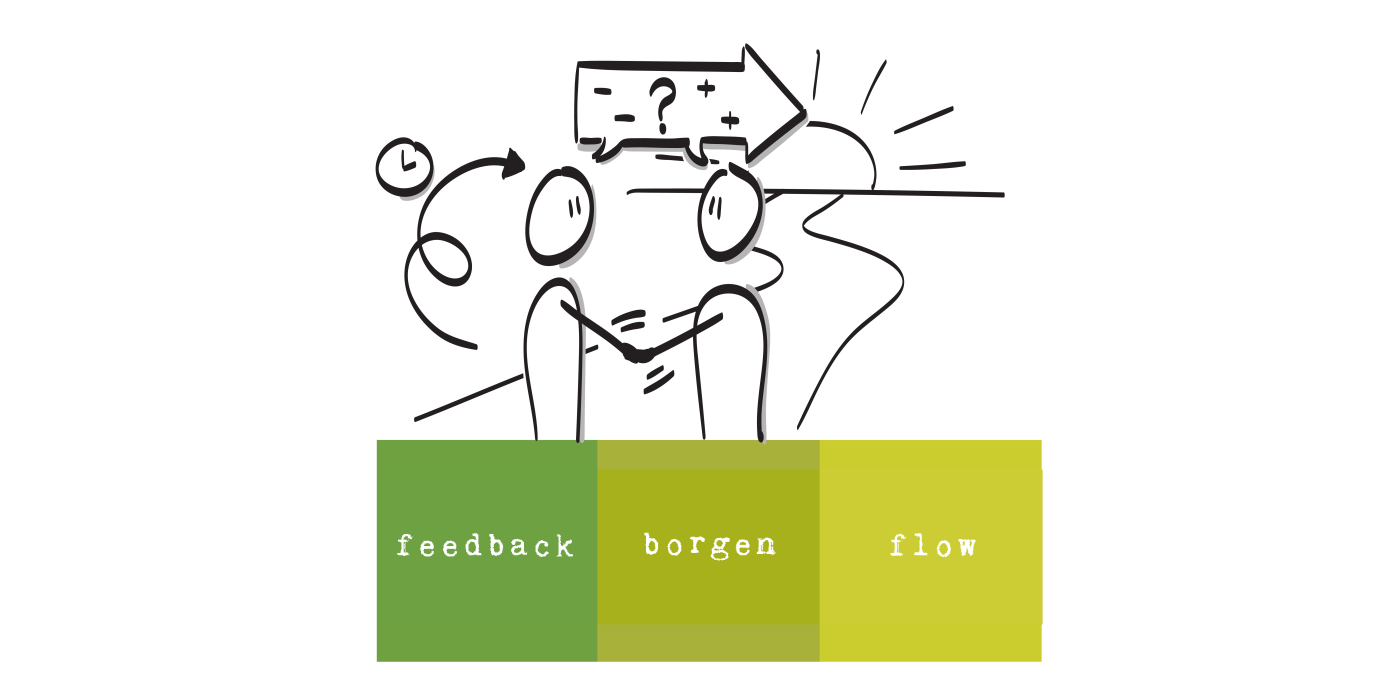All top teams 'bail', but what is that really?
They sometimes say that staying at the top is even harder than getting there. It is no different with cooperation. To keep cooperation at a high level, securing is an indispensable step. But it is also a step we often get questions about: "Nice that securing, but how do I do it?" Here are four aspects involved in assurance.
Becoming a good team is done by securing
Just a step back. To get on the Scale of Cooperation from avoidance into Cooperation, you must first over the threshold to feedback. Talking to each other and becoming honest with each other from a position of connection and trust. If that is mutual (you want to tackle it together) and from a shared goal, then we speak of feedback.
But just giving each other feedback is not enough, you have to act on it and come back to it. It is essential to know who can do what differently, and to discuss with each other over time whether things are better now. Was the feedback useful? Have the agreements been taken up? Are improvements still possible? And finally, celebrate the success you have already achieved, especially the small steps! Acting on feedback together is safeguarding!
Staying a good team is done by securing
Now suppose you and your team have been working well together for some time. You give regular feedback to each other and you follow up on it. There is trust and connection. Everyone can do what they are good at and you learn from each other. And there are 'Flow' moments in the cooperation: moments of sudden (external) pressure, when everyone automatically thinks along, offers themselves and picks up 'their thing'. Then you could say you are a high performing team. But how do you stay that way? How do you make sure that when someone leaves and a new colleague joins, things still keep going so well?
You make sure of that by staying in conversation with each other about why the cooperation is going so well. By continuing to invest in connection and trust, encouraging each other to keep growing. By continuing to look for opportunities to do things even more nicely/better/efficiently. And by keeping cooperation and the common goal central at all times. That too is safeguarding!
Concentrating on content, process and cooperation, that is safeguarding
As a team, you have set and unstated team goals, which are divided into sub-goals for which individuals or sub-groups are responsible. Finally, for most organisations, it is all about results.
It also requires a process to achieve results: a strategy, a division of labour and procedures. Most of the time goes into these two aspects: content and process. Brainstorming sessions, hushed sessions, meetings and team days are usually about content and process.
But those who listen to top teams are reminded that there is a third aspect which is essential for any top team, and that is the cooperation: "How are you progressing? Are you keeping up? Who is or is not on track? Who needs help? How are you doing in this hectic time? Do you need to make adjustments? Who is good at what and would like to contribute something extra in that area? Listen to Chantal, she has a good idea..."
In short: holding each other respectfully accountable for everyone's part in achieving shared goals, pushing forward together and getting better by specialising. Everyone is heard and contributes. That's what makes a team a top team. That is securing!
Cooperation during a crisis: Corona
Anyone watching television will see a genuine revival of appreciation. If only four months ago we were demonstrating on Malieveld and many people were angry, the corona crisis is stirring up something else. With even star spots right now about the hard workers in healthcare, the silent workers in the cleaning sector, the hauliers on the road day and night, the farmers who provide food, the funeral workers... Public appreciation is being given by everyone to the people 'at the front'. Understandably so, as extraordinary achievements are made by many in corona times. Three important conditions for staying in Cooperation are thus met: recognise that there is something (very important) to do, i.e. a common goal; rubbing shoulders together and getting the job done become accountable (e.g. being available for an extra shift). And the people doing the work appreciate for what is going well. Safeguarding is something you do together!
Conclusion
So securing consists of several aspects and is essential for a team to function at a high level of cooperation for a longer period of time. Achieving the common goals together by giving feedback, coming back to it, keeping each other sharp on process and content and giving appreciation for what everyone contributes. That's securing!

